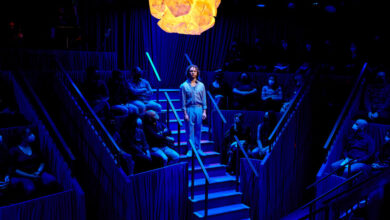Their Characters Are Stuck, but the Filmmakers Are Anything But

A young woman shows early glints of genius — but her parent falls ill, so she never leaves the nest, forced to stay behind to help out. Then something happens, a tipping point, and her absent siblings return. There is tension, conflict, reconciliation.
In the end it’s a story about how the woman fits her own autonomy into a satisfying groove with her cultural heritage. It’s also about how sisters and brothers can dust off forgotten relationships and live in symbiosis.
Infuse this tale with comedy and you get “Definition Please,” written, produced, directed by and starring Sujata Day. Glaze it in drama and it becomes “Donkeyhead,” written, directed by and starring Agam Darshi.
Both plots center on stubborn, imperfect women: In “Definition Please,” Day plays Monica, a former Scribbs Spelling Bee champion (yes, that’s a play on the Scripps National Spelling Bee) who tutors the next generation of would-be champions. “Donkeyhead” finds the failed writer Mona (Darshi) carving out a life of isolation while caring for her ailing Sikh father.
Day and Darshi, actresses making their feature directing debuts, had never met before Array, Ava DuVernay’s distribution company, picked up their films, then released them on Netflix this month. But the striking parallels were immediately apparent.
As soon as Darshi watched “Definition Please,” she emailed Day, writing something along the lines of “This is uncanny,” she said in a joint interview. Day loved that the themes echoed so similarly in two movies that are ultimately so different.
The 34-year-old Darshi (whose acting credits include “Funny Boy”) was born in Britain, raised in Canada and now lives in Los Angeles; her background is Sikh Punjabi Indian. The 37-year-old Day (“Insecure”) was born and raised an hour outside Pittsburgh, and her background is Bengali Indian.
“Something that Hollywood tends to do is: ‘This is an Indian! This is an Indian!’” Day said. “And you’re like, ‘Wait, but Gujaratis are different from Punjabis, different from Bengalis, different from South Indians. We all eat different things, we have different traditions.”
In Day’s film, characters sip Thums Up cola, crunch masala-flavored Lays chips and snack on rasgulla sweets — some of the director’s favorites. She worked with her composer, Amanda Jones, to craft a Bengali track that functions as a theme song of sorts throughout the movie. The song also passed an unofficial test: Day’s parents approved of the lyrics. The New York Times’s reviewer, Lisa Kennedy, also approved of the film, calling it “impressively nuanced.”
Darshi, too, focused on details, like the turban worn by Mona’s brother, Parm. There’s nothing that bothers the filmmaker more than a bad-looking turban onscreen. Stephen Lobo, who plays Parm, is not Punjabi, but a group of “actual Sikh Punjabi uncles” (older men in the community) she cast started talking to Lobo in Punjabi, thinking that he was one of them.
“It’s such a stamp of approval when people from your own culture pick up those little details that maybe nobody else will, but they’re exact to how they know the culture to be,” Darshi said. “That feels so good.”
(The Times’s reviewer, Beatrice Loayza,wasn’t taken with the film, calling Mona’s character “frustratingly opaque.”)
Yet these stories and their protagonists are not bound by their roots. The films are, ultimately, universal tales about family, loss, mental health and sibling rivalries.
“No matter what you are,” Day said, “you’re going to look at these characters and find bits of them and be like, ‘Oh, I really relate to that.’”
The two directors were shaped by opposite experiences. Growing up in “small white towns” all over Canada, Day felt stuck between two worlds. At one point, she wanted to change her name to Grace, which, she said, would be easier to pronounce than Agam. In Greensburg, Pa., Day went to Hindu temple summer camp and took bharatanatyam dance classes on Sundays at the temple. But their paths ultimately took them to similar places.
“I never felt torn between two cultures,” Day said, but she found that “Western media really emphasizes stereotypes of how we are, and I wanted to push against those stereotypes.”
Both filmmakers were interested in seeing themselves in movies that felt more universal — that let them choose “and” instead of “or.” Darshi’s goal was to show audiences that South Asian, Indian American and Indian Canadian women like Mona can be messy and, just like everyone else, flawed.
“There used to be a time when the opportunities we got, as actors, as filmmakers of color, were based on creating work that had to do with our ethnicity and our culture,” Darshi said. “Things are changing. And now we can just be.”
Behind the scenes, Darshi and Day were juggling hats — writer, actor, director — to pull off seemingly seamless films. Darshi, who will be seen in the forthcoming HBO Max show “DMZ,” compared the experience to that of DuVernay, who is producing the series, about a future American civil war. Deeply prepared and charming, Darshi said, DuVernay had to be “everything to everyone.”
“You can’t be a person of color and not be political,” Darshi said. “Just by the mere fact that we look the way we look. And we’re in an industry that doesn’t look like this. And so as a result, the pressure of what is required is that much higher and the ask is that much greater.”
Five Movies to Watch This Winter
1. “The Power of the Dog”: Benedict Cumberbatch is earning high praise for his performance in Jane Campion’s new psychodrama. Here’s what it took for the actor to become a seething alpha-male cowboy.
2. “Don’t Look Up” : Meryl Streep plays a self-centered scoundrel in Adam McKay’s apocalyptic satire. She turned to the “Real Housewives” franchise for inspiration.
3. “King Richard”: Aunjanue Ellis, who plays Venus and Serena Williams’s mother in the biopic, shares how she turned the supporting role into a talker.
4. “Tick, Tick … Boom!”: Lin-Manuel Miranda’s directorial debut is an adaptation of a show by Jonathan Larson, creator of “Rent.” This guide can help you unpack its many layers.
5. “The Tragedy of Macbeth”: Several upcoming movies are in black and white, including Joel Coen’s new spin on Shakespeare’s “Macbeth.”
Day, who played Sarah, a meanspirited co-worker in “Insecure,” was inspired by Issa Rae, a creator, writer, producer and star of that HBO show. She had been working with Rae since “Awkward Black Girl,” Rae’s precursor web series, and left with the knowledge that if Rae could do it all, then so could she.
But by no means would it be easy. For their first features, Darshi and Day (who had the vibrant poster for her short “Cowboy and Indian” on display behind her during the interview) plunged headfirst into preparation.
“I was ridiculously prepared for any question, anything that came my way,” Darshi said. “So that any scene that happened, I knew why the curtain was yellow, why the person was wearing pink shoes, what kind of time of the day, what music I would hear.”
Each detail, down to the peeling wallpaper, was a choice that Darshi deliberated over with her production designer, Marian Wihak. But much of that painstaking groundwork wasn’t done for the direct benefit of the viewer. Rather, the director felt that as long as she knew why something was the size, shape, texture it was, that would shine through in the movie.
Day felt the same way. “I never wanted to overexplain anything,” she said. “It just is, in the film.”
The inverted musical numbers scattered throughout “Definition Please” illustrate her point: Whenever a conventionally attractive man enters a scene, the camera cuts to a close-up, slow-motion shot, colorized in blue, backed by upbeat romantic music. No explanation is given about the Bollywood trope of musical numbers inserted into films (often objectifying women) — but none is necessary to enjoy the bit.
“I just said to myself, ‘Let’s take these risks, let’s see what happens,’” Day said. “‘And if we fall flat on our faces, we fall flat on our faces.’”
But in both films the family is greater than the sum of its parts. In “Donkeyhead,” Mona’s successful siblings — Parm, Sandy and Rup — descend upon their parents’ home in Canada from London, New York and Toronto.
“Mona’s probably the most honest, compared to the other three,” Darshi said. “She’s the one who will say it as it is. And is like, ‘Well, you do this, and you’re like this, and you’re doing this. Yeah, I might be a mess, but at least I’m honest about the fact that I’m a mess.’”
While Mona holds her siblings accountable, Monica’s mess is still hidden in “Definition Please.” As she tries to force her brother, Sonny (Ritesh Rajan), onto medication for his bipolar disorder, it becomes apparent that she needs help, too.
“I wanted to show that they are feeding each other,” Day said. “Monica and Sonny’s relationship is really important for the growth of both of them to occur at the same time, even if the growth of one is minuscule as opposed to one leaping over a giant mountain.”





